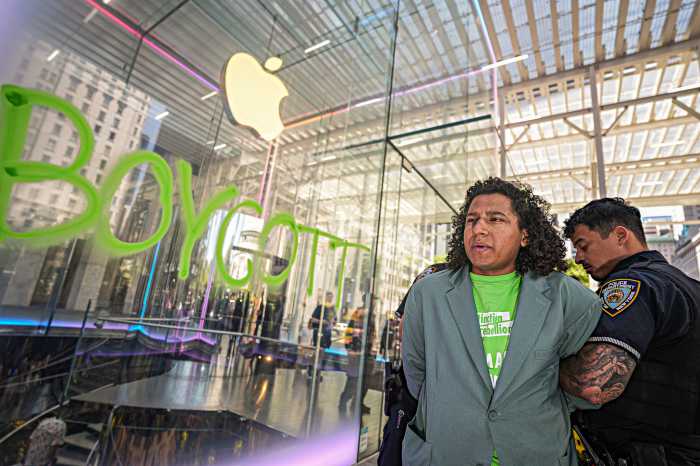On a recent weekday afternoon, the intersection of Rockaway Boulevard and Atlantic Avenue in Ozone Park looked like many other sun-flooded crossings in Queens. School buses returned children home; mothers pushed their toddlers in strollers; an elderly woman shakily made her way down her front steps, a cane in one hand, the railing in the other. A Kingdom Hall of the Jehovah’s Witnesses loomed in the background.
However, in front of Convenience & Grocery, a 24-hour deli precariously plopped on one corner, a woman paced back and forth. She picked up the pay phone for a minute or two, paced some more, and then exchanged sideways glances with a man who got intimate with the phone booth, as if feeling around for a quarter he had dropped.
Dee Bhoj watches this scene unfold everyday, though hardly through rose-colored glasses. As a manager at Convenience & Grocery, Bhoj can look out from his perch behind the register through the scratched glass door plastered with lotto and newspaper decals. He sees two or three prostitutes during the day, and said there are nearly a dozen who hang out in front of the store at night.
“We have troubles with all the prostitutes outside. We yell at them, we call the cops sometimes but they never take action about that,” said Bhoj, frustrated by a 20-year-old saga that replays repeatedly in front of his store.
Bhoj cited drug use and panhandling that takes place when prostitutes have no customers. His patrons regularly complain, but Bhoj said he can’t continue leaving his business to go outside and chase away the girls.
“You have to do something about that, that’s all,” he said.
Bhoj and other aggravated residents may have found their knight in shining armor in Eric Ulrich, the president of Our Neighbors Civic Association of Ozone Park.
The graffiti and robberies that have paved the way for prostitution “give the psychological impression of lawlessness,” said Ulrich, who noted that few other neighborhoods with single-family homes have prostitution problems.
“I think the time for action is definitely now,” he said, urging police and elected officials to clean up his neighborhood.
Ulrich’s words ring a little louder because of recent sightings of prostitutes near Liberty Avenue and 93rd Street, a previously uncharted area.
An active member of the community, who wished to remain anonymous, saw women approaching vehicles in front of a deli on one corner of the intersection at around 10:30 p.m. Saturday, April 5.
“No. I am not OK with this. It’s not right that people are soliciting on the streets,” said the source, who noted that in his 42 years living in the area he has always seen “at least two or three girls” at Rockaway and Atlantic but had never previously seen prostitutes at 93rd and Liberty.
Jun Park, who has owned the deli at 93rd and Liberty for three years, seemed unperturbed when first told of the prostitution sighting. But, he closes at 5 p.m., Park later said, long before neon store signs cast hazy spotlights on shady street deals.
“I haven’t seen anything,” said John, an employee at Tommy’s Pizza on Liberty Avenue across from the deli.
However, John said the restaurant had been closed for three weeks and even when it was open for business, he never has time to look outside.
Johnathon Carter, 19, and others in his crowd admit the area has its share of crime but they are skeptical that prostitution is encroaching on their turf.
“I can be walking down the street at midnight and I’ll be by myself,” explained Carter, who lives in the neighborhood and often passes time late at night in front of a store down the block.
Sure enough, just before midnight that same day, the block was barren aside from the occasional passing car or lone individual making his or her way home. The deli’s gray metal gate was nothing but a blank canvas, waiting for the ladies of the night to emerge and cast their shadows.
Detective Ralph Vega of the Queens Vice Squad said he had not heard of prostitutes near Liberty and 93rd nor was he aware of an increase in patrols that would have driven prostitutes into the new territory.
“When we get complaints, depending on the time, we reinforce patrols a little,” he said, explaining that Rockaway and Atlantic has “always been an issue.”
While it seemed to be a quiet night all around, Rockaway and Atlantic was still an issue. A woman sauntered up and down the block, occasionally peeking over her shoulder and conversing with two young men on the steps of Convenience & Grocery, ultimately disappearing into a vehicle.
Louis Martell, an area resident, said this sort of activity comes with the territory.
“Believe me, I know the streets; there’s a good side and a bad side,” he said.
“That’s the way it is. We do not wish to do it, but that is what you have to do to survive. Personally, I do not let that bother me. I go on with my life.”
Nevertheless, others, like Ulrich, are not so complacent.
“It’s probably an indication of the decline in quality of life in the community,” he said.
“It’s not looking good.”






























